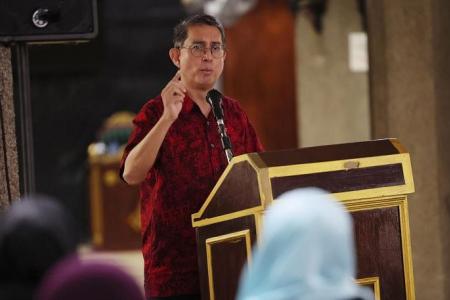Programme helps Muslim offenders break free of drugs
In 2021, Aminah (not her real name) received a message from her pregnant friend’s phone number, asking her to meet at a supermarket to buy milk powder.
But when she arrived at the supermarket, Aminah was nabbed by plain-clothes officers from the Central Narcotics Bureau (CNB). She was later sentenced to 12 months in the drug rehabiliation centre (DRC) for consuming methamphetamine, commonly known as Ice.
After her release, she was sent back to the DRC in April 2023 for consuming the same drug.
Aminah, 31, is now among the latest batch of supervisees who have completed the Insan Mukmin (pious individual) Muslim intensive religious programme.
The 20-week programme is conducted while participants are in prison and continues when they are on community-based programmes, which allow suitable inmates to serve the tail end of their sentence in the community.
The programme is organised by the Singapore Islamic Scholars and Religious Teachers Association (Pergas), Fitrah (Family and Inmates Through-care Assistance Haven) and the Singapore Prison Service.
The 17 male and 10 female supervisees who recently completed the programme received certificates from Minister of State for Home Affairs Muhammad Faishal Ibrahim on March 3 at the Darul Aman mosque in Eunos.
Speaking to the media, Aminah, who is now a delivery attendant, said the programme taught her how to discern whether her friends are a good or bad influence. She has also gone back to reciting the Quran.
According to a fact sheet from the organisers, the Insan Mukmin programme has three phases. The first two, which are conducted before the supervisees start their community-based programme, teach them positive values and pro-social habits that are aligned to Islamic values and principles.
During the third phase, participants are assigned a befriender from Fitrah to initiate the first steps towards pro-social and positive support networks, and to facilitate their participation in various social activities organised by mosques.
Since its pilot in October 2015, over 100 people have participated in the programme.
Originally aimed at providing structured and intensive religious counselling to selected male Muslim inmates from the DRC, the programme was expanded in 2022 to include male inmates beyond the DRC as well as female inmates.
According to figures released by CNB in February, there was a worrying increase in the number of young and female drug abusers arrested in 2023.
A total of 3,101 drug abusers were arrested in 2023, up 10 per cent from the 2,826 in 2022.
New drug abusers arrested in 2023 came up to 944, up 18 per cent from the 802 in 2022. More than half were below the age of 30.
In total, 454 female drug abusers were arrested in 2023, compared with 408 in 2022.
In his speech on March 3, Associate Professor Faishal said he observed the programme for female participants at Darul Aman mosque in January, and spoke to them.
“Many said the programme had positively impacted their lives, and many were determined to remain steadfast in their rehabilitation and reintegration journey,” he said.
Faiz (not his real name), 46, who has completed the programme, was first incarcerated at 16 and has since spent more than 20 years behind bars.
He started as a lookout for drug abusers, and then tried heroin out of curiosity.
He went on to commit various offences including drug consumption and trafficking, as well as rioting.
After his release in 2016, Faiz was clean for about five years, during which he worked as an inspector of drilling tools in Australia.
When he returned to Singapore during the Covid-19 pandemic, he faced financial issues and returned to abusing drugs after meeting his friends.
He was sentenced to three years in the DRC in November 2022 for consuming Ecstasy.
The father of four is now working in pest control and plans to further his studies in the Quran.
“I’ve tried all avenues and ways to change my life since the age of 16. This is a new avenue I would like to try. Maybe I can change through spiritual healing.” he said.
Get The New Paper on your phone with the free TNP app. Download from the Apple App Store or Google Play Store now


